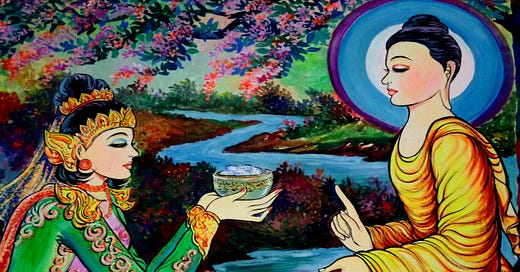Powerlessness as Practice: From Property Chains to Pure Land Buddhism
How Losing Control Leads to Liberation
I keep checking my phone, waiting for a message that never comes.
There have been days when I have wanted to pull my own hair out.
The Chain of Suffering
Delay, after delay, with no explanation. We are selling a house, and buying another one. The house we are buying is ready to go. Our solicitors have the contract that we have signed; all that we need to do is finish selling the house that we own.
Stress travels up and down the chain. Our vendor chases their estate agent, who chases us; we chase our buyer and our solicitor. Sometimes there is a little movement. Sometimes we get a straight answer. Mostly the process unfolds at its own slow pace and the reasons for the delays remain mysterious.
I have been ready to move for weeks. We have handed over the day to day running of the temple to the stewards. I try not to spend my time thinking about the move, and searching for a lever to pull that will make the whole thing work out.
That lever doesn’t exist.
It’s no coincidence that I wrote about a crisis of faith in the last newsletter. Crises have been on my mind. Feeling lost has been on my mind.
Powerlessness can be a great teacher.
I try to make the house move happen but right now there is nothing that I can do. I sit with the frustration and eventually I remember that for Siddhartha Gautama powerlessness was the gateway to enlightenment.
After leaving home Siddhartha Gautama spent six years in ascetic spiritual practices. He spent time in meditation, doing difficult physical yoga, and fasting, trying to force his awakening.
He became so weak from fasting that he collapsed on the side of the road.
We might have never heard of the Buddha if it wasn’t for a young woman called Sujata. She was taking food offerings to a local shrine and noticed the body of Siddhartha at the side of the road. Instead of taking her food to the shrine, she used it to revive Siddhartha.
After this his enlightenment came easily.
The Buddha’s awakening came not from his own power. He failed in that. That failure created an opening. Experiencing his own personal powerlessness opened him up to experiencing the support of a much greater power. We call this power Amida Buddha, Nirvana, the Pure Land or simply things as they are.
His awakening was a shift in awareness.
From the point of view of enlightenment there is nothing to achieve and nowhere to go.
I am desperate for news that isn’t coming and there is nothing I can do to make it arrive. I am powerless. But remembering the Buddha’s story moves me from frustration to acceptance.
With acceptance comes:
Gratitude for all the things I already have now: a place to live, support from friends and family, a good career and so on.
A sense that whatever happens with the house move I’ll be okay.
Confidence that reality in the present moment is trustworthy.
There is nothing to achieve and nowhere to go.
And then I start dreaming about moving house, and start to feel frustrated again. It’s no wonder the Buddha was so down on attachment!
But having experienced acceptance once makes this next round of frustration easier to bear. I trust that this frustration will pass away and I’ll move back into acceptance again.
After writing this piece we got that message we’d been waiting for. One hurdle down. There are others still to go. Watch this space.
I’m curious
Have you experienced this shift from powerless to acceptance? Have difficult experiences become great teachers for you? Let me know in the comments.






Kaspa, this reflection resonated deeply with me. There was a time when my LinkedIn profile boldly declared, "I breathe challenges." Back then, I thrived on control—turning obstacles into achievements, finding the right lever to pull, and forcing outcomes through sheer determination. But reading your words reminded me of the moments when all my effort, all my "breathing challenges," wasn’t enough—when powerlessness became unavoidable.
Those moments were excruciating but transformative. Like you, I’ve learned that sometimes the lever simply doesn’t exist. Acceptance isn’t just about surrendering to the situation; it’s about opening to a different kind of wisdom—a quiet, patient awareness that everything unfolds as it must.
Surrender, as I’ve come to understand it, is about holding space for everything that emerges—the beautiful, the good, the bad, and the ugly. It’s not about transcending but subscending—moving into the depths of my own soul and the experiences of my life. Memories and truths emerge only when they are ready, when they are willing to be released. That willingness is never guaranteed, and surrender becomes a practice of trust and presence. Your retelling of the Buddha’s story reminds me that failure isn’t the opposite of progress; it can be the threshold to something deeper. Thank you for sharing this—it’s a powerful reminder of the grace that can emerge when we stop striving and simply *are.*
I can't believe that all these years and I have never heard about Sujata! That is lovely.
I am shaped by many years of begging, hoping, praying, demanding that my spouse would acknowledge that addiction was destroying his life and our life together. Frustration after frustration, grief after grief, as he denied, or temporarily acknowledged just maybe it was true only to later go back to his addiction.
It was only when I gave up that change occurred. Only when I got in my bones that there was nothing I could do. Only after truly letting go of him/us that I could find peace and see a path for me. (And, I'm happy to say, that, not immediately, but some time after I released my grasp, my partner found his path to acceptance.)
Good luck, fingers crossed.